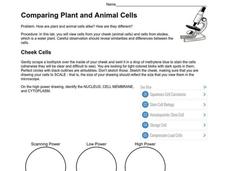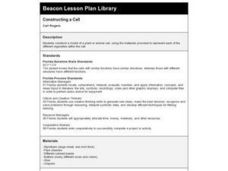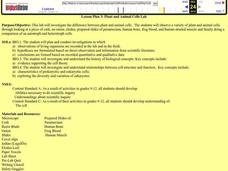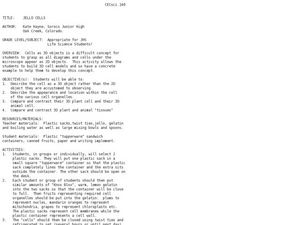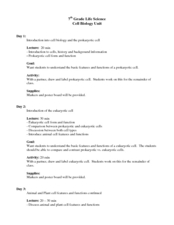Curated OER
Build Your Own Cell
In this building your own cell worksheet, students identify cell vocabulary and facts, and create posters of a labeled plant cell and an animal cell. In this fill-n-the-blank and posters worksheet, students provide twenty-three answers.
Curated OER
Comparing Plant and Animal Cells in a Venn Diagram
In this science graphic organizer worksheet, students fill in a Venn Diagram by comparing plant and animal cells. They use the words from the word bank to fill in each portion of the graphic organizer. They use words such as...
Curated OER
Comparing Plant and Animal Cells
In this comparing plant and animal cell worksheet, students use a microscope to observe cheek cells and onion cells. They compare their observations and answer 3 questions about their discoveries.
Curated OER
Plant and Animal Cells: Alike and Different?
Seventh graders create a mneumonic device and a graphic organizer about the parts of plant and animal cells. In this biology instructional activity students are introduced to the parts of the cells and then work in groups to create...
Curated OER
Bread Cells
Fifth graders examine plant and animal cells. In this plant and animal cell lesson, 5th graders define what cells are, label their parts, and describe how plant and animal cells are different. They observe cells at a number of web sites,...
Curated OER
Animal and Plant Cell Journaling Activity
Jump into the classification of animal and plants cells, through this inviting lesson comparing Elodea leaves and Epithelial cells. Middle school learners will create wet mounts, write journal entries that compare specimens, and finally...
Curated OER
Cells: A First-Hand View
In the first of two activities, your charges prepare wet mount slides of cork and bean sprout cells in imitation of Robert Hooke's historical investigation. An excerpt from his notes is included. Then, investigators compare animal cells...
Curated OER
Comparing Plant and Animal Cells
In this comparing plant cells and animal cells worksheet, students view cells from their cheeks and cells from elodea. A Venn diagram reveals similarities and differences between the cells.
Curated OER
MAKING THREE DIMENSIONAL PLANT AND ANIMAL CELLS
Students create two different cells, one plant and one animal. In this plant and animal cell lesson students form groups and construct a part of a cell. Students then put them all together to form one plant or animal cell.
Pace University
Grade 6-8 Living Things
What characterizes a living thing? Scholars explore the concept during a differentiated instruction unit on living things. They perform lab experiments to determine how animals adapt to stimuli, watch videos and learn about...
Curated OER
Comparing Plant and Animal Cells
In this cell comparison worksheet, students complete a table in which they compare the cell parts and organelles of plants and animals. They answer 4 short answer questions based on the information in the table.
Curated OER
The Cell as a System
Students review cell structures and investigate how the components of a cell operate as a system. They compare a plant and animal cell and then make a model of a cell. Students begin to understand the cell as a system by exploring a...
Biology Junction
Plant Cell Coloring Worksheet
In this plant worksheet, pupils define each part of the plant cell. They color and label the cell drawing and then compare and contrast plant and animal cells.
Curated OER
Cell-O
Students create model cells using gelatin, toothpicks, and various fruits to represent organelles. Then, students observe their models and complete a Venn Diagram comparing and contrasting plant and animal cells.
Curated OER
Constructing a Cell
Third graders, in groups, make a model of a plant or animal cells and represent each of the organelles in the cell.
Columbus City Schools
Let’s Get Theoretical About Cells
Get up close and personal with cells in a hands-on journey to discover what makes up living things. Scholars learn valuable microscope skills, delve into the Modern Cell Theory, and gain insight into how cells reproduce. The included lab...
Curated OER
Cell Structures
Students differentiate between a prokaryotic and eukaryotic cell and give examples of both types. They differentiate between a plant and animal cell. Students will be able to name features common to both as well as unique features of each.
Columbus City Schools
Cell-abrate!
Lights, camera, action! With the cell at center stage, guide your seventh grade biologists through the tiny drama that plays out within every living thing. Then, enjoy the show as they portray the organelles they've studied—a performance...
Curated OER
Plant and Animal Cells
Students investigate the difference between plant and animal cells. They observe a variety o plant and animals cells by looking at a piece of cork, an onion, elodea, prepared slides of paramecium, human bone, frog blood, and human...
Virginia Department of Education
Cell Parts
What do a bird, an egg, a rabbit, and a toad all have in common? This fun-filled resource explains the similarities and differences between cells and how all cells are similar, yet all are different. Learners begin by depicting a...
Curated OER
Jello Cells
Students create a three dimensional model of a cell. In this cellular structure lesson, students use gelatin, plastic bags, plastic containers, and fruit to construct a model of a cell. They compare the cells structures and stack them to...
Curated OER
Cell (Biology)
Students conduct a series of activities to explore the nature of cells. In this biology lesson, students observe plant and animal cells under the microscope and compare them. They differentiate osmosis and diffusion.
Curated OER
Cell Theory, Plant And Animal Cell Comparison
Tenth graders study plant and animal cells. In this investigative lesson students draw their own animal cells and label them.
Curated OER
Cell Biology
Identify the different cell organelles in prokaryotes. Modelling the cells using Jell-o and candies will be a fun way to experience the cell in a hands-on way (different to using play-doh!). They observe cells under a microscope and draw...









